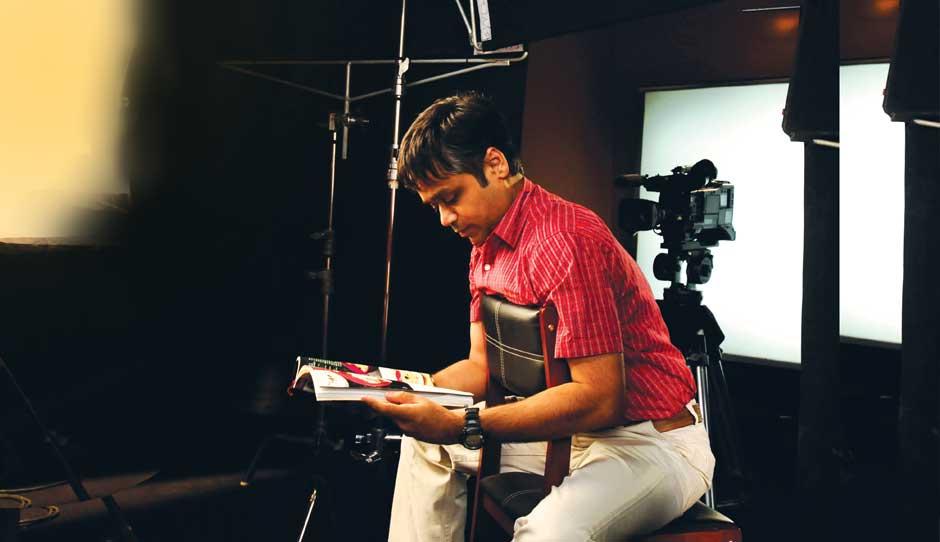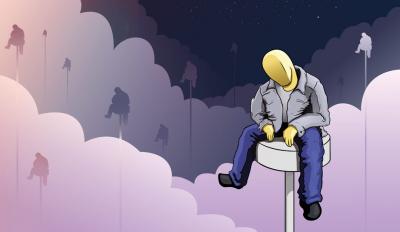Why Colosceum's Ajit Andhare Can't Switch Off from Work
- BY Nikita Saxena
 In Operations
In Operations 17795
17795 0
0

Ajit Andhare, founder and CEO of Colosceum Media, spent the first 12 years of his professional life deriving a new meaning from his marketing job—creativity. He admired the way ad people could come up with new ideas constantly. Although he loved his job, he always found something amiss. So he gave up his posh corporate career to plunge straight into entrepreneurship, prompted by “an insistent inner voice”. That voice has been all-important since. It helped Andhare decide on a career in television content and visualise his first programme—Wheel Shrimati—which is in its fifth successful season today. He didn't worry about being new to television. From his own experience, he knew a stress on technical skill or domain knowledge could kill a passion. It took away his love for the tabla, for sure. No wonder, Andhare stays true to his inner voice—in things big and small—as he takes the Rs52-crore Colosceum Media to greater creative heights.
A media CEO’s life follows a markedly different routine. I realised that as soon as I started building Colosceum Media four years ago. My company is not built on capital alone. A lot of emotional and physical investment goes into this. Sports and exercise are my answers to the stress. I knew both Colosceum Media, and Mumbai, where we are based, would cost me my life, routine and physical health—and if I was not on the top of things I wouldn’t be able to make it. Interestingly, I discovered a love for squash and exercise almost simultaneously, as I started building Colosceum Media.
Every morning, I’m up by 6.30am. Depending on what day of the week it is, there is either squash or a rigorous exercise session to finish. For business, Mumbai is the place to be—but it’s a tough city. You can never feel in control here. Especially, when you have to deal with its harrowing traffic every day—no wonder I feel most “out of control” when I am driving. Which is why my morning routine gives me some sense of control. It prepares me to not cow down to the challenges that the city and a typical work day throw at me. I recharge my body, mind and soul in the morning. By 8.30am, I’m done with my exercise.
From Masterchef India to the Roadies and a host of fiction shows, Colosceum has been able to eastablish itself as a one stop shop for businesses that are looking for content generation/
Once home, I have breakfast with my family as I scan the day’s newspapers. A priority for me in the morning is to spend time with my two daughters—one of them is four, and the other is eight years old. I try to get them ready for school everyday.
However immersed I may be in the familial duties, work or thoughts of work, is never far away. Richard Branson once said that he sees no distinction between work and play. I too live in a similar state: work’s life for me. Colosceum Media is not my job, it’s my third baby. In fact, the company was founded around the same time my second daughter was born.
At night, even though I may switch off my BlackBerry, I never switch off from work. My BlackBerry’s on from early morning—its a good time to start conversations. When I’m commuting, I’m constantly on the phone, especially during the nearly hour-long drive from home to office. Our company is really about the business of ideas. In our job, creativity is the main currency. We need to be thinking ahead. We need to ask—what’s next for us, and therefore, for the viewers—constantly. How can we be different from the rest of our ilk? Now that we have an idea, how can we execute it successfully?
So from the moment I step into office, around 10.30am, I start talking to five key cogs of Colosceum’s operations. These are my go-to guys from the creative, production and finance teams. In meetings we take stock of our live projects. Then the best part of the day—brainstorming and bouncing off new ideas. Some of us pitch in the ideas, others trash them. At the end of the day, we are our worst critics. One of the unique challenges in this job is that we need to think out-of-the-box constantly. In fact, when I quit my corporate life, it was this energy and excitement of content television that drove me towards it. I was in the marketing sector and often worked along side the advertising and creative teams. When we were brainstorming and developing marketing plans for my previous brand—Wheel—we came up with the idea of Wheel Smart Shrimati. I sort of conceptualised the whole idea and thought of making it into a television show. When I got the chance to interact with the creative and advertising team, up-close, I sort of audaciously thought, “I might actually have a creative bent of mind.”
At night, even though I may switch off my BlackBerry, I never switch off from work.
Till today, it’s the brainstorming bit that keeps my team and me on our toes—it keeps us happy. Because of these discussions, mornings are usually an intense time in office. These aren’t your typical corporate office mornings of hushed quiet and shuffling feet. In the media world, we’re all up till quite late in the night. My creative team may well have been in a shoot or in the edit room till 2am to 3am—so it’s unfair to expect them to be up and running by nine. But when they are up and about, they are a dynamic set of people.
Most people saunter in between 10:30-11 in the morning. But only in a few minutes, the office energy is electric and buzzing. Mornings are like the early phase of a company: energy levels are really high. Once the creativity starts, and people get into the “zone”, things start moving almost automatically.
On a lighter note, the caffeine and Red Bulls the teams guzzle down also keep people on their toes. My high comes from the ideas and discussions. Those are my “tonic”. Ideas are essential for our well-being. If we are not always stoking the creative fire, we’ll be in trouble.
The start of a firm resembles the Big Bang, all heat and intensity.
I have “in” and “out” days in office: client meetings and shoots are the out days. At the client meetings, pitching in new ideas and arguing the cases, teams are usually full of enthusiasm and excitement. But nothing beats the shoots—those are the craziest of times. We sort of travel across the globe for them—we flew to Brazil for a season of MTV Roadies. We shot Splitsvilla (again for MTV) at Dubai, and in 2012, we will be taking it to Ibiza. The first season shoot for MasterChef India happened in Jaipur. There’s no knowing where our job will take us next. I have shot in grandiose sets built in ramshackle Mumbai studios, in the palaces of Udaipur and Jaipur, and in camps of the Border Security Force. We have shot high up north, south and in the west.
I do travel extensively for the shows, however, I try to balance the in and out days. Between my assistant and me, we have the shoot and office days planned out in detail. I usually try to concentrate on the task at hand. If I’m not in office, I try not to be anxious about what’s happening there. Unlike regular corporate offices where a lot depends on numbers being generated and analytics constantly happening, this is a different business. Unlike my corporate days, there’s a sense of freedom that being an entrepreneur offers. I don’t feel slotted to a chair or a role. Similarly, if I am not there at a shoot, I don’t hyperventilate. Cameras don’t stop if I am not there. Being on spot, however, helps us understand how a show is shaping up.
When we travel, we have a tendency to do so as a pack. We’re a very close-knit team. If we’re all in office, we try to do lunch between 1-1.15pm, sit down together to talk of everything apart from shop. This is the time when we catch up with each other. I know a lot about my team’s personal lives, I talk to them about it. I work with creative people. It’s imperative that I treat them with respect, compassion and empathy. Managing people is the biggest aspect of running a business. The other things keep evolving irrespective of close attention.
The start of a company resembles the Big Bang: it’s all heat and intensity. As you go along, you start putting systems in place to cool things down a bit. To assume the role of a strategist, as a founder, I had to delegate work. It wasn’t tough. I didn’t feel the separation pangs that a lot of people talk about. After all, my immediate team comprises the operational experts—these guys are supposed to be good at what they are doing. I always try to remember that I am the generalist among them. As their leader, my work is to designate responsibilities and deliverables that also link up to the overall vision of Colosceum. Let’s take a simple example: a firm’s vision is like an image in a colouring book. How you decide to colour the pages is up to each team. I think that’s why the experts find it harder to delegate work than I do. I understand that I am basically asking people to perform a contrary role: stay away for a bit but be on the job 24/7.
However, to be fair, my role is somewhat similar: let go to stay plugged in. I intervene only when I am asked to. At the same time, I have to be at a distant yet conscious, focused and always “right there”. I try to make sure that our office is a creative den. At 38, I’m possibly the oldest person here. Our people have stamped the space with their individuality. The head of the fiction team has done up his workspace in a theme of his choice. The head of the non-fiction team has a completely different theme and space. Our edit rooms are called Adda and Den. The office walls are covered with animated posters and photographs—of Phantom from the Indrajaal Comics and of show posters. There’s no bigger “yahoo moment” than entering through the office doors and staring straight at a poster of a show that you’ve helped create, ideate and produce. The office is a pleasure to be in—it’s vibrant. Now that I think of it, there is a theme of black and red repeated in some sections of the office. Only the area that we call the “idea room” is less vibrant. It’s more a sanctuary—done up in soft furnishings and bean bags. While the space that looks remotely formal or corporate-like is the conference room.
There’s no bigger “yahoo moment” than entering through the office doors and staring straight at the poster of a show that you’ve helped create, ideate and produce. - Ajit Andhare
Activities continue unabated till 8pm. Then, it’s time to wrap up for some of us. Those in charge of production and post-production often stay back well into the night. I like to wrap things up early so I can be home by 9pm to tuck in my daughters. Though, to be honest I do miss doing that if I am attending calls or get stuck in traffic.
After the babies are safely in bed, it’s television time for me and my wife. TV is like homework in this profession—there’s a lot of idiot box viewing through the day for me. Evenings, I surf channels again to gauge the content that’s the trend. Often, I discuss themes with my wife. She’s one audience I can’t ignore even if I want to! I also read a lot of popular magazines to see what people like to know about. But, these activities are less relaxing for me than it is for others. Real relaxation is listening to Kishore Kumar and Mohammad Rafi songs—melodies from vintage Bollywood. Sometimes, I also take a walk around the neighbourhood before I hit the sack. Most often my mind is screaming pack up before my body.
Note: Ajit left Colosceum in 2013, to join Viacom 18 Motion Pictures as its COO.





























Add new comment